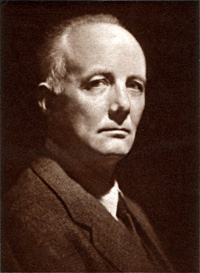 |
| Highly Rewarded Liar Hermann Rauschning |
Hermann Rauschning was a disgruntled former member of the NSDAP who wrote a book, marketed variously as Conversations with Hitler or The Voice of Destruction, that revealed what were supposed to have been private conversations in which Hitler had made many shocking statements. This book was highly influential and heavily utilized in Anglo-American war-propaganda. Most of the “quotes” of Adolf Hitler found in the U.S. War Department’s Why We Fight series of propaganda-films, for example, are derived from Rauschning.
Among the astounding statements attributed to Hitler by Rauschning are the following:
“Terror is the most effective political instrument.”
“I am willing to sign anything. I will do anything to facilitate the success of my policy.”
“Providence has ordained that I should be the greatest liberator of humanity. I am freeing man from the restraints of an intelligence that has taken charge, from the dirty and degrading self-mortification of a false vision called conscience and morality, and from the demands of a freedom and independence which only a very few can bear.”
“Yes, we are barbarians. We want to be barbarians, it is an honored title to us. We shall rejuvenate the world. This world is near its end.”
“The Ten Commandments have lost their validity. Conscience is a Jewish invention, it is a blemish like circumcision.”
This is just a sample, but you get the idea. The picture of Adolf Hitler that Rauschning presented was of an amoral megalomaniac with whom any attempt to have peaceful dealings would be foolhardy and futile.
As for Rauschning himself, he achieved fame and fortune, selling many books and writing a syndicated weekly newspaper-column in the United States during the war. He was even called as an expert witness in the Mass-Sedition Trial of 1944.
In early 1939, before war had broken out, Rauschning was declaring that Hitler was bent on war and would launch a surprise attack on Britain and France. This is not what happened, but the fact that Rauschning was saying such things — and being widely quoted in news-media — tended to increase paranoia and make war more likely.
More generally, once one accepts Rauschning’s representation of Hitler as a madman, one can more easily accept other bizarre claims about him. In that way, Rauschning’s fiction served as a foundation that established credibility for the rest of Anglo-American war-propaganda.
In effect, Hermann Rauschning was to Adolf Hitler and Germany what Ahmed Chalabi was to Saddam Hussein and Iraq — a disgruntled defector willing to profit from lying. (The CIA considers defectors to be untrustworthy as sources of information, but they have been nonetheless effective as propagandists.)
The worst part is that many mainstream historians, apparently reluctant to let go of the old notions that were originally instilled as war-propaganda, still use Rauschning as a source. But even in works about Hitler and National-Socialist Germany where Rauschning is not cited as a source, his influence seems to persist in the form of a general presumption about Hitler’s character.
A Swiss researcher named Wolfgang Haenel — in no way a friend to Adolf Hitler — determined in 1983 that Rauschning’s supposed conversations with Hitler were not authentic for the following reasons, summarized by Hanns Neuerbourg:
Haenel says his research established that:
— Rauschning, who headed the government of the Free City of Danzing (now Gdansk, Poland) after the Nazi party won local elections there in 1933, never belonged to the “innermost circle” of Hitler confidants.
— Records show that Rauschning, an honorary colonel in the SS elite guard, had only a very few meetings with Hitler, and none in private.
— Rauschning admitted he kept only “scanty jottings” of his meetings with Hitler. His “confidential” quotes include excerpts from later speeches by the Fuehrer and paraphrased comments from Hitler’s Mein Kampf.
— Numerous distortions and fabrications in the book were designed to strengthen Allied resolve and to encourage the United States and other nations to join the war-effort.
— A chapter on “Hitler Himself” in which Rauschning tells of the Fuehrer hearing voices, waking at night with convulsive shrieks, and uttering unintelligible phrases, was inspired by a novel by French writer Guy de Maupassant. [Hanns Neuerbourg, AP, 2 November 1985]
If we had paid attention to Haenel in the 1980s, instead of remaining naive about lying defectors and their demonization-propaganda, perhaps we would have recognized in 2003 that Ahmed Chalabi was really the Hermann Rauschning of Iraq.